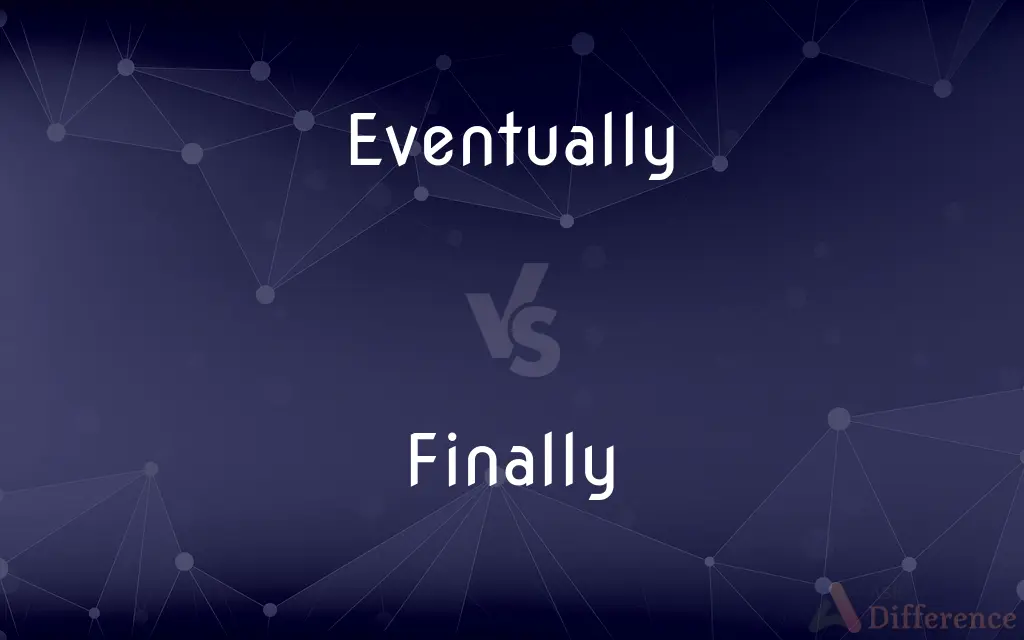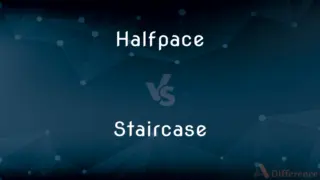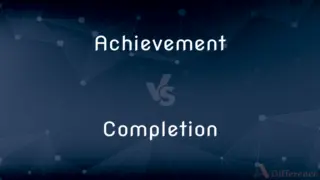Eventually vs. Finally — What's the Difference?
By Urooj Arif & Fiza Rafique — Updated on April 2, 2024
"Eventually" implies that something will happen at an unspecified time in the future, often after a series of events or delays, while "finally" indicates the conclusion of a series of events, emphasizing the end of a process or wait.

Difference Between Eventually and Finally
Table of Contents
ADVERTISEMENT
Key Differences
"Eventually" is used to suggest that an outcome is expected to occur at some point in time, without specifying when. It often implies a sense of inevitability despite potential delays or obstacles. This term is frequently used to convey patience or the natural progression of events leading to a certain conclusion. For instance, saying "She will eventually learn to ride her bike" suggests that, with time and practice, success is expected. On the other hand, "finally" is used to mark the end of a sequence of events or a long wait, often conveying a sense of relief or completion. It highlights the last step in a process, indicating that what follows marks an end to what was happening before. For example, "After years of study, he finally graduated" emphasizes that graduation is the concluding step in the educational process.
While both words deal with the passage of time, "eventually" focuses on the future outcome without a clear indication of when or under what circumstances it will happen. It carries a tone of anticipation or gradual progression towards an end. "Finally," however, emphasizes the culmination of events or efforts, often providing a sense of closure or fulfillment. It's the difference between an open-ended wait for an outcome and reaching the endpoint of a journey or task.
In narrative contexts, "eventually" can be used to keep the audience engaged with the unfolding story, hinting that developments will occur over time. "Finally," however, is often used to signal a climax or resolution, bringing a sense of conclusion to a narrative or discussion.
The choice between using "eventually" and "finally" can also reflect the speaker's perspective on the timeline and significance of events. "Eventually" might be used to temper expectations about the timing of an outcome, while "finally" might be used to underscore the significance of reaching a long-awaited goal or conclusion.
Comparison Chart
Definition
Indicates that something will happen in the future, at an unspecified time.
Marks the end of a series of events or a long wait.
ADVERTISEMENT
Implication
Anticipation of an outcome without clear timing.
Conclusion of a process with a sense of closure.
Tone
Patience, inevitability, and progression.
Relief, completion, and fulfillment.
Use in Narratives
Suggests future developments or outcomes.
Signals climax, resolution, or a concluding step.
Perspective
Open-ended, focusing on eventual outcomes.
Emphasizes the end of efforts or waiting.
Compare with Definitions
Eventually
In the end, especially after a long delay or series of problems.
They eventually arrived after getting lost twice.
Finally
Marks the resolution of a narrative or situation.
The mystery was finally solved in the last chapter.
Eventually
Used to convey an open-ended timeline.
The project will be completed eventually.
Finally
After a long time, typically emphasizing the end of a series of events.
After a long journey, they finally reached the mountain's peak.
Eventually
Implies a future outcome without specifying when.
You'll eventually get the hang of it with more practice.
Finally
Used to introduce the last point or action.
Finally, she turned off the lights and went to bed.
Eventually
Suggests inevitability despite obstacles.
He'll eventually realize you were right.
Finally
Indicates relief at the conclusion of a process.
He finally finished writing his thesis.
Eventually
Indicates patience or gradual progression.
She eventually mastered the piano after years of practice.
Finally
Emphasizes the culmination of efforts.
After years of hard work, she finally achieved her dream.
Eventually
In the end, especially after a long delay, dispute, or series of problems
Eventually, after midnight, I arrived at the hotel
Finally
Forming or occurring at the end; last
The final scene of a film.
Eventually
At an unspecified future time
Eventually rose to the position of vice president.
Finally
Of or constituting the end result of a succession or process; ultimate
An act with both an immediate and a final purpose.
Eventually
In the end; at some later time, especially after a long time, a series of problems, struggles, delays or setbacks.
Everyone's true colors will be revealed eventually.
Finally
At the end or conclusion; ultimately.
The contest was long, but the Romans finally conquered.
Eventually
For some tail; for all terms beyond some term; with only finitely many exceptions.
Eventually, all prime numbers are odd.
Finally
(sequence) To finish (with); lastly (in the present).
Finally, I washed my dog.
Eventually
Possibly, potentially, perhaps
I will come eventually, but haven't decided yet.
Finally
(manner) Definitively, comprehensively.
The question of his long-term success has now been finally settled.
Eventually
In an eventual manner; finally; ultimately.
Finally
At the end or conclusion; ultimately; lastly; as, the contest was long, but the Romans finally conquered.
Whom patience finally must crown.
Eventually
Within an indefinite time or at an unspecified future time;
He will understand eventually
He longed for the flowers that were yet to show themselves
Sooner or later you will have to face the facts
In time they came to accept the harsh reality
Finally
Completely; beyond recovery.
Not any house of noble English in Ireland was utterly destroyed or finally rooted out.
Eventually
After a long period of time or an especially long delay;
At length they arrived
Finally
After a long period of time or an especially long delay;
At length they arrived
Finally
The item at the end;
Last, I'll discuss family values
Finally
As the end result of a succession or process;
Ultimately he had to give in
At long last the winter was over
Common Curiosities
Is "finally" only used at the end of a sequence of events?
Primarily, yes. "Finally" is used to indicate the last part or conclusion of a series of events, often with a sense of relief or completion.
How does "finally" affect the tone of a statement?
"Finally" can add a tone of conclusiveness or relief to a statement, emphasizing the end of a period of waiting or effort.
What does "eventually" imply about timing?
"Eventually" implies that something will happen in the future, but it does not specify when, suggesting an open-ended timeline.
Does "eventually" always suggest a positive outcome?
Not necessarily. While it often carries a tone of inevitability or anticipation, the outcome it refers to could be positive, negative, or neutral.
How do "eventually" and "finally" differ in narrative storytelling?
In storytelling, "eventually" hints at future developments without revealing when, keeping readers engaged, while "finally" signals a resolution or climax, offering closure.
Can "eventually" and "finally" be used interchangeably?
Not usually, because they imply different things about timing and conclusion. "Eventually" is more open-ended, while "finally" indicates an end or resolution.
How do perspectives on time differ between "eventually" and "finally"?
"Eventually" presents a more indefinite perspective on time, focusing on eventual outcomes without a specified timeline, while "finally" presents a definite conclusion, emphasizing the end of a timeline or series of events.
Can "finally" be used to express relief?
Yes, "finally" often expresses relief or satisfaction at reaching the end of a long process or wait.
Why might a writer choose "finally" over "eventually" in a conclusion?
A writer might choose "finally" to underscore the significance of reaching the conclusion, offering a sense of closure to the narrative or argument.
Can "eventually" imply uncertainty?
It can suggest uncertainty regarding the timing of an outcome, but it typically implies that the outcome itself is expected or inevitable.
Share Your Discovery

Previous Comparison
Halfpace vs. Staircase
Next Comparison
Achievement vs. CompletionAuthor Spotlight
Written by
Urooj ArifUrooj is a skilled content writer at Ask Difference, known for her exceptional ability to simplify complex topics into engaging and informative content. With a passion for research and a flair for clear, concise writing, she consistently delivers articles that resonate with our diverse audience.
Co-written by
Fiza RafiqueFiza Rafique is a skilled content writer at AskDifference.com, where she meticulously refines and enhances written pieces. Drawing from her vast editorial expertise, Fiza ensures clarity, accuracy, and precision in every article. Passionate about language, she continually seeks to elevate the quality of content for readers worldwide.














































